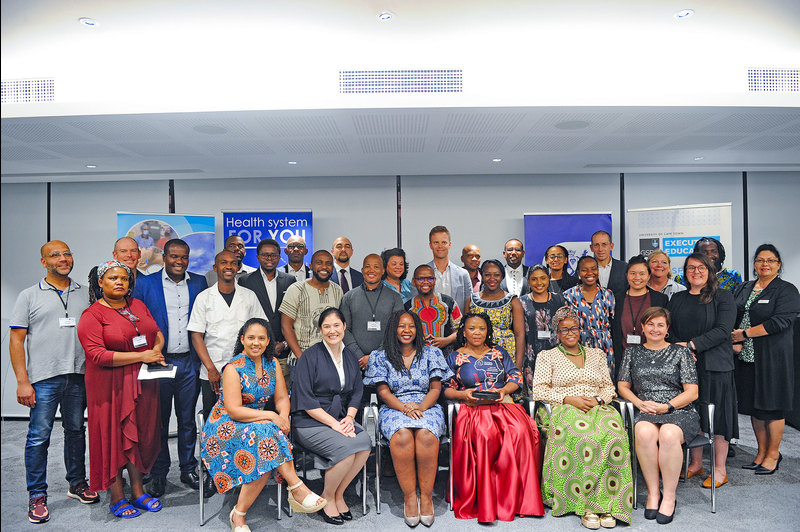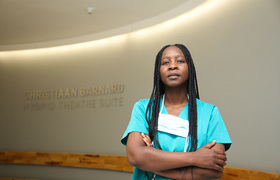Collaboration, leadership, failure – the mainstays of advancing leadership in global surgery
01 March 2023 | Story Niémah Davids. Photos Lerato Maduna. Read time 6 min.
The importance of collaboration – between faculties, African nations and government – to design and lead evidence-based projects that will improve surgical outcomes and influence healthcare on a large scale was one of the overarching themes that emerged from a University of Cape Town (UCT) Global Surgery event this week.
The special event was held to welcome new delegates to the Executive Leadership in Global Surgery programme – a cross-collaboration between the UCT Graduate School of Business (UCT GSB) and the Global Surgery Division in the Faculty of Health Sciences. The programme equips leaders in healthcare in both the public and private sector with the skills and expertise they need to become change agents in their fields. The welcome event was held at the UCT GSB on Monday, 27 February. Outgoing UCT Vice-Chancellor Professor Mamokgethi Phakeng; Catherine Duggan, the director of the UCT GSB; and Dr Nomafrench Mbombo, the MEC for Health in the Western Cape, were also in attendance.
Professor Salome Maswime, the director of the Global Surgery Division, also used the occasion to announce that Dr Mbombo has been named the official patron of the programme – a move that has further solidified the relationship between the Department of Health in the province and UCT.
“It’s an absolute pleasure to have you as our inaugural patron. You believed in us from the beginning and we are excited to be on this wonderful journey together with you,” Professor Maswime told Mbombo.
Creating a workable system
Addressing leaders in surgery from across the continent, Mbombo said she was thankful for the opportunity. She said over the years she has learned that healthcare is a discipline driven by multiple, interrelated systems that should function cohesively.
“I’ve learned that surgery is not just about an anaesthetist; it’s not just about a surgeon; it’s not about a sterile surface.”
“I’ve learned that surgery is not just about an anaesthetist; it’s not about a surgeon; it’s not about a sterile surface. It’s more about a system. We are talking about a system within a system,” she said.
Mbombo encouraged the cohort to use their time to come up with pragmatic solutions to global healthcare challenges – both in and outside of their disciplines and in turn to address inequality in healthcare on the continent.
“The message [I want to convey is] to create [or] recreate the surgical system. How do we think globally? [What are the] best practices [in surgery] and how do [we] customise them regionally for Africa?” she asked. “Surgeons, customise [best practices] regionally and think about the population,” Mbombo said.
The result of a dream
For Professor Phakeng, the Global Surgery Division and the birth of the programme are as a result of a dream and vision, which have now come true. But how are these dreams and visions fulfilled, she asked.
“I always talk about UCT as being a place of opportunity, and what makes it a place of opportunity are the people, the place and the purpose. The people are the students and staff; the place is our location – not only because it’s the best-looking place in the country but it’s the best place [to conduct] research. And purpose, because we’ve got a big vision with a massive transformative purpose – a big why, which is to unleash human potential for a fair and just society,” she said.
And with a big transformative purpose, Phakeng added, comes the recruitment of staff who can make that vision possible, and sometimes it’s necessary to do it all in unconventional ways.
“That’s how we managed to get global surgery [started] and today we have an Executive Leadership programme in global surgery and it’s because we recruited a visionary, a dreamer and did it in an unconventional way. Salome [Maswime] came with a big vision,” she said.
Fail forward
During her address, Dr Duggan reminded the cohort that leadership requires doing things the unconventional way and to sometimes allow for failure.
“I want to invite you into my house – the GSB – where we support failure.”
“Sometimes, if we’re not failing, we’re not learning. I know that as surgeons failure is something with which you have a very complicated relationship. So, I want to invite you into my house – the GSB – where we support failure,” she said.
Duggan also encouraged delegates to take risks without fear of any repercussions.
“This might be the only time that if you go too far or too hard, no one will die. So, I welcome you and encourage you to please take risks. This is a safe place to take risks. This programme is an extraordinary place to take risks,” she said. “It’s a question of allowing yourself the capacity and permission to fail, and to fail fast so that you can get that out of your system and so that you can go on and do what you need to do.”
Others who contributed to this event included: Professor Lydia Cairncross, the head of UCT’s Department of Surgery; Professor Lionel Green-Thompson, the dean of the Faculty of Health Science (FHS); and Associate Professor Tracy Naledi, the deputy dean of health services in the FHS.
 This work is licensed under a Creative Commons Attribution-NoDerivatives 4.0 International License.
This work is licensed under a Creative Commons Attribution-NoDerivatives 4.0 International License.
Please view the republishing articles page for more information.



















